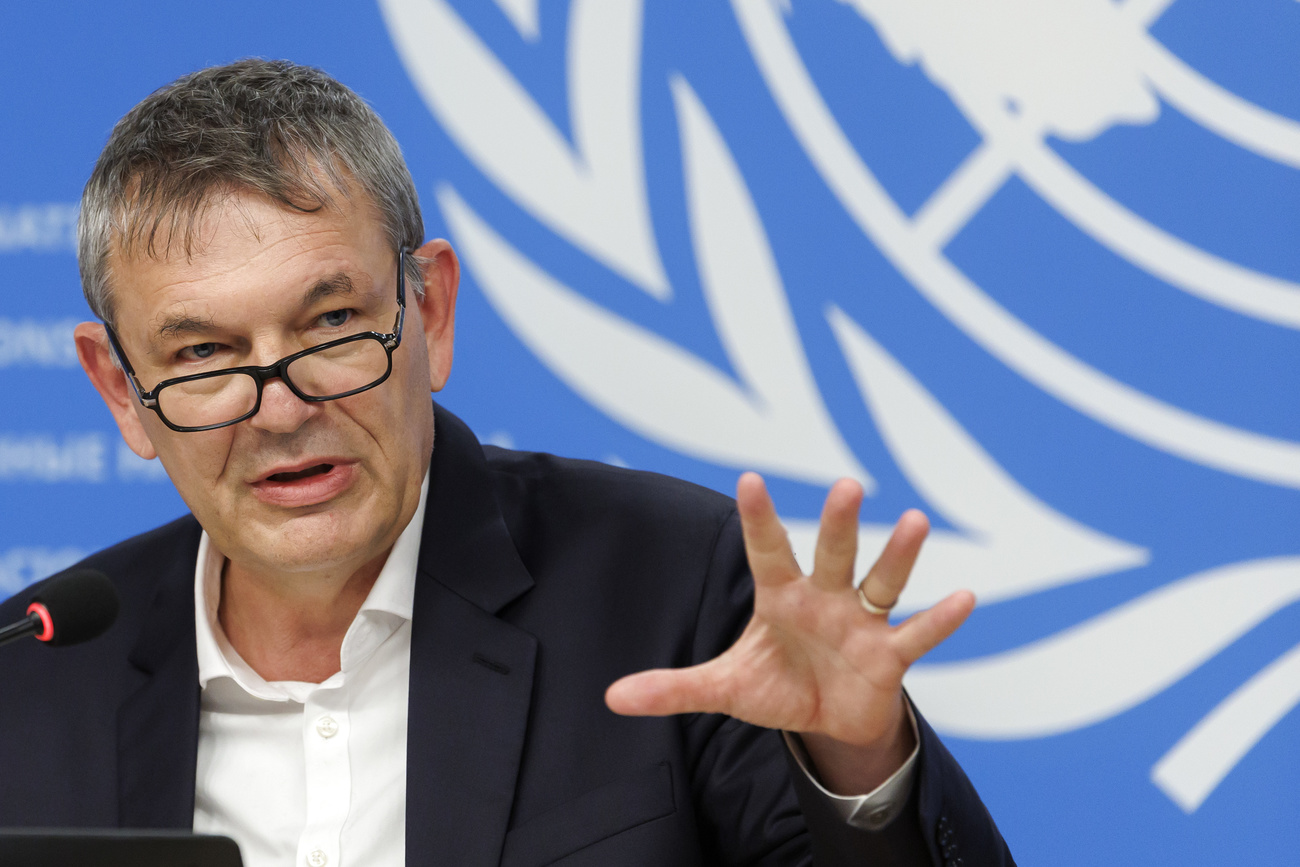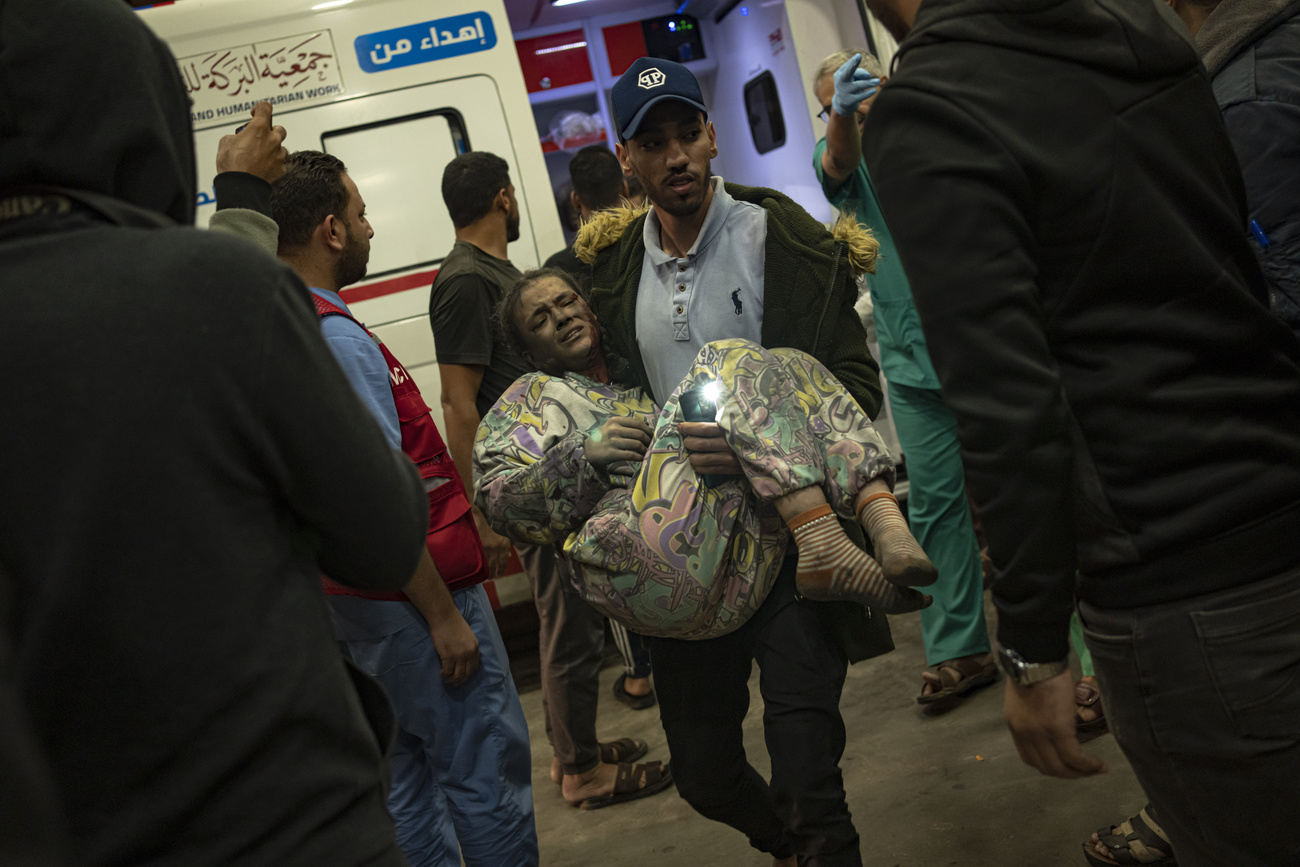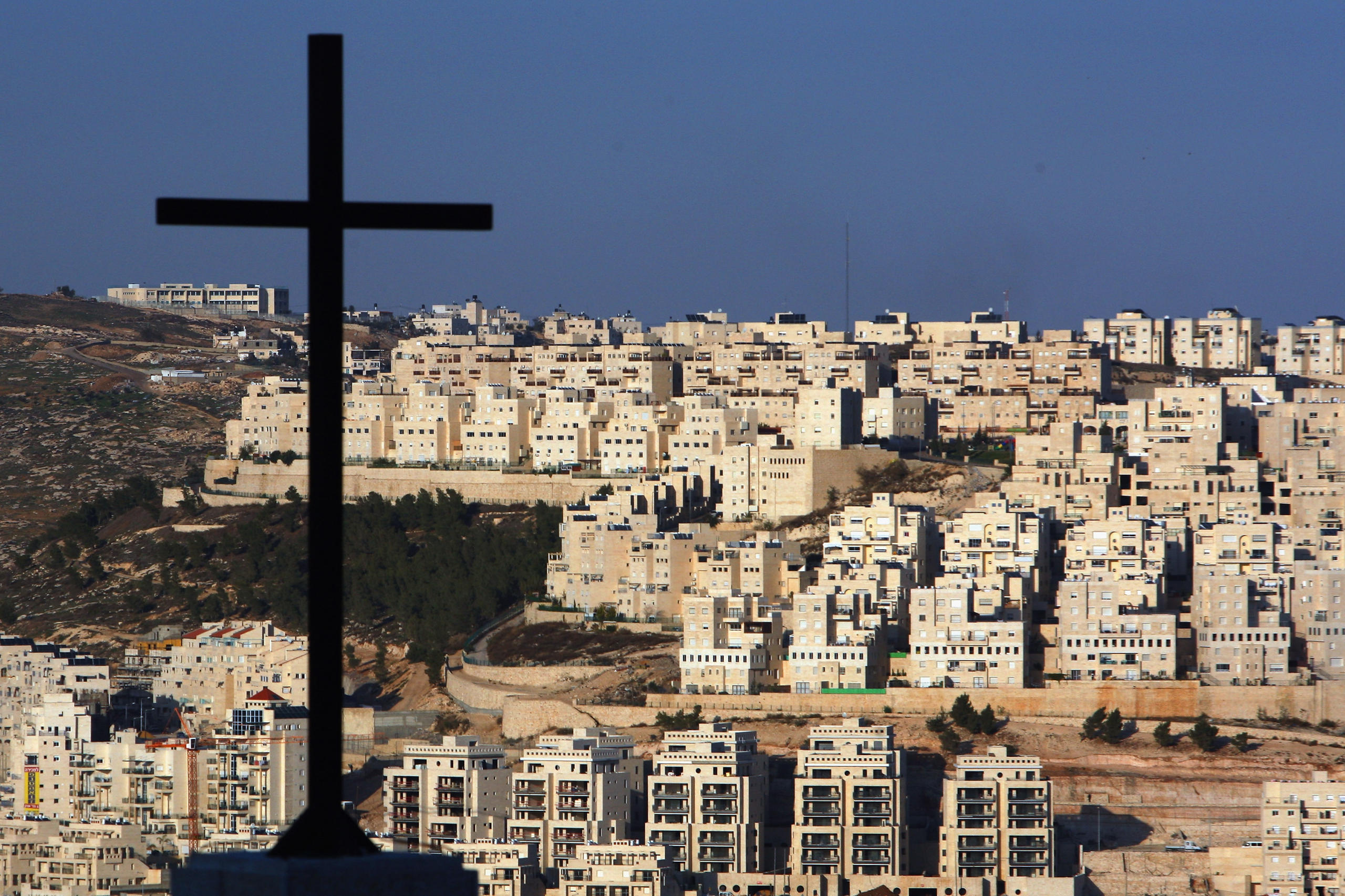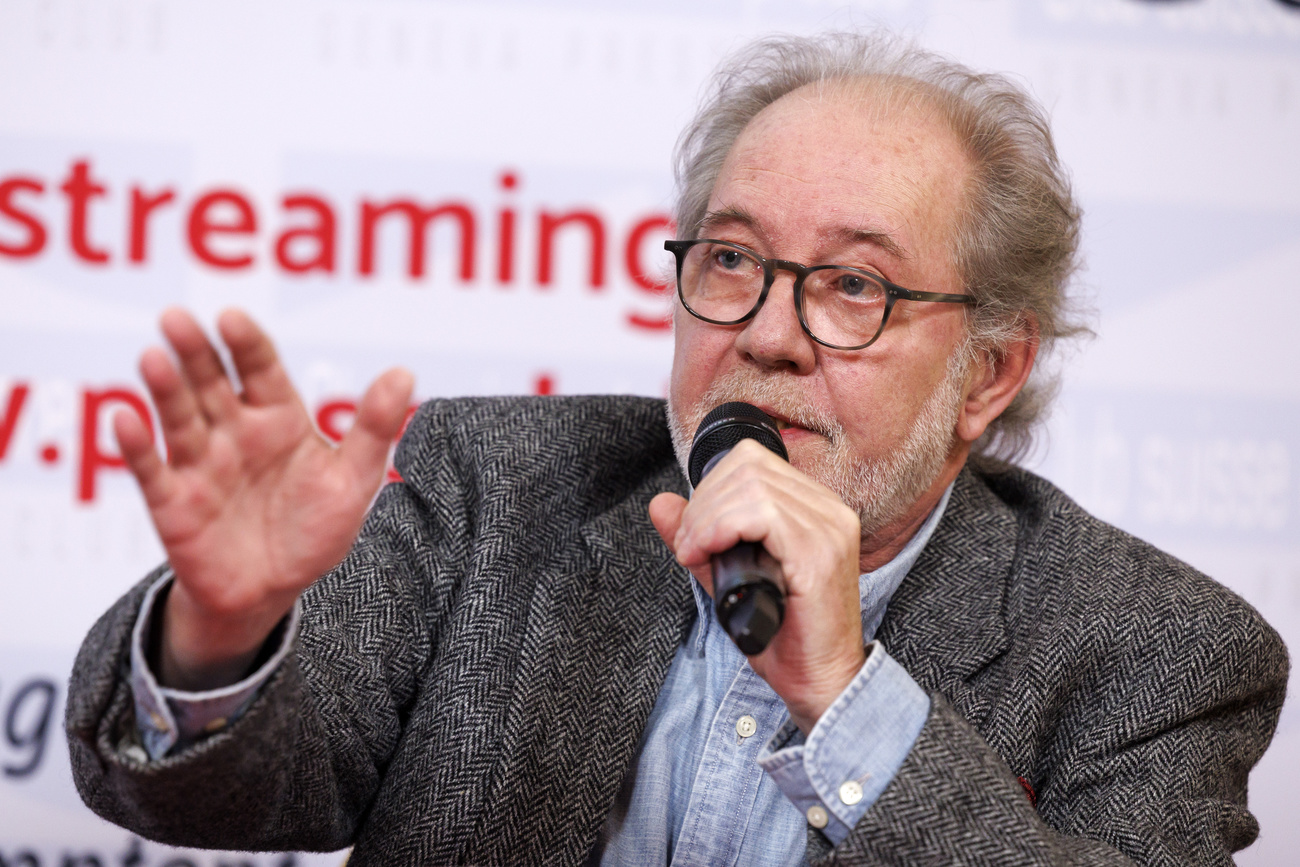Philippe Lazzarini: ‘fuel is now synonymous with life’

The head of United Nations Relief and Works Agency, Philippe Lazzarini, is sounding the alarm about the lack of fuel in Gaza, which is used to produce water and run hospitals. The humanitarian agency is in danger of suspending its aid to the Gaza Strip. Philippe Lazzarini talks to SWI swissinfo.ch.
The head of the UN Agency for Palestinian Refugees, Philippe Lazzarini of Switzerland, was in Geneva on Thursday to denounce the deadly consequences of the siege imposed by Israel on the Gaza Strip. While his organisation’s humanitarian staff have suffered heavy losses, he believes that there is nowhere safe in the Palestinian enclave. We caught up with him for an interview.
SWI: On Monday, you said that in the absence of fuel deliveries, United Nations Relief and Works Agency (UNRWA) would cease its humanitarian operations in Gaza within 48 hours. What is the situation today?
Philippe Lazzarini: We no longer have any fuel for the production of drinking water. Two major drinking water and desalination plants have had to shut down, depriving around 70% of the population in southern Gaza of drinking water. On Thursday morning, the municipality of Rafah [located in southern Gaza] informed us that the generators for its wastewater treatment pumps were no longer working. As such, this water is starting to spill out into the street. We sounded the alarm two days ago, announcing that certain services would cease, and that is what is now happening. We know that lack of access to drinking water and sewage is a breeding ground for epidemics.
We need to act now. Today, fuel is synonymous with life; it enables water to be produced, hospitals to function and bread to be made in bakeries. The longer we wait, the more the siege of Gaza will become the main cause of death in the Gaza Strip.
SWI: In concrete terms, on Friday you won’t have enough fuel for your operations..
We may still have the means on Friday, but not on Saturday, to unload the lorries at the Rafah terminal [editor’s note: border crossing between Egypt and Gaza through which aid enters]. But I’m not going to be able to send the lorries from our goods warehouses to the various schools where we have shelters.
For the moment, the fuel received [from Israel] only allows us to carry out maintenance between the arrival of the convoys on the Egyptian side at the Rafah terminal and our warehouses.
SWI: UNRWA is the main humanitarian organisation in Gaza. What has it been like for your teams on the ground over the last few weeks?
We have 13,000 Palestinian employees in the Gaza Strip. They’re completely bewildered by the turmoil. Their lives have changed completely overnight. Today, those living in Gaza are less able to picture their future in Gaza.
In fifteen years, they have been through six wars. But this is really one too many – and the most destructive. Today, any Gazan who can afford it or who finds a way to leave the Gaza Strip, in my opinion, will not hesitate to do so.
SWI: There is also a shortage of fuel for telecommunications. Can you still communicate with your teams?
Yes, our managers in Gaza have satellite phones and are therefore connected to a different network. But they can no longer communicate with their teams on the ground, which makes our operations extremely difficult, if not impossible. Because without coordinating movements, without ‘deconflicting’, i.e. notifying the Israeli military authorities on the ground where they are, the movements of our teams become extremely dangerous.
SWI: 103 UNRWA humanitarian workers have been killed since October 7. An unprecedented number for the UN. Is it still possible to work safely in Gaza?
There is no safety in Gaza. There is no safe place. It’s the only place in the world where people fleeing the war can’t cross borders and have nowhere to go. Until now, they have gone to UN and UNRWA facilities. But today, we are completely at capacity.
And even our facilities have come under rocket and missile fire. More than 60 of our facilities have been damaged, more than 60 people have been killed and hundreds injured. So even the UN facilities are not the safe haven that people thought they were.
SWI: 800,000 people are in UNRWA schools. Are you able to cover their needs?
No. Humanitarian aid is trickling into the Gaza Strip. Most people have left at the last minute, left with nothing, leaving everything behind. There is no longer a local market, no basic goods are available. There is a high concentration of people in the south of the Gaza Strip, which is twice as overcrowded as it was before. Sanitary conditions are appalling. Imagine being 800 people for one toilet. You have to wait three hours before you can use it, and there’s no water.
Today, we’re trying to cover the basics: water. It’s frightening to see a child begging for drops of water with your own eyes. It’s as if, in less than 24 hours, they have been stripped of any right to a minimum of dignity.
SWI: On Wednesday, the Security Council adopted a resolution calling for humanitarian pauses and corridors. After the failure of several resolutions, this is good news..
We would have preferred a resolution at the beginning. But it is welcome because it calls for repeated humanitarian pauses, which we hope, in time, will be longer time frames to pave the way for a genuine ceasefire.
It also calls for humanitarian aid to be proportionate to the needs identified, and for this aid to be provided without interruption and unconditionally. So on this point, the voices of the humanitarian organisations have been heard.
The question now is how to ensure that it is implemented. The next few days will tell us whether the much-needed fuel can enter Gaza.
SWI: In April, you told us that “the growing gap between expectations and resources could lead to the implosion of UNRWA”. Expectations are now even higher, as are needs. Do you have the resources to deal with this crisis?
No, we don’t have enough resources. But everyone expects UNRWA to play a major role; today, in this unprecedented humanitarian crisis in Gaza, but perhaps also tomorrow elsewhere if the conflict spills over, which we don’t expect to happen. UNRWA also plays a crucial role in the West Bank, East Jerusalem, Lebanon, Jordan and Syria.
When we think about the situation after the siege, there is the expectation that the UNRWA is the agency best placed to respond to certain critical public service needs such as education or primary care.
So we have to be consistent. In my opinion, it is in the collective interest to have a stable UNRWA. And to do that, we need to ensure its funding.
SW: You have been the head of UNRWA for three years. You have extensive experience in the region. This is undoubtedly the worst crisis you have ever faced..
It’s extremely difficult because emotions are running high. And because all the emotions are so strong, no one is able to hear the other. And that’s one of the reasons why I have reminded all the leaders who have come to the region, who have come to see us, that a gulf is widening between this part of the world and the West. It is important that we take stock of the extent of this gap. And it’s time to demonstrate that empathy for pain has no hierarchy. It should be expressed in the same way, whether for a family of hostages in Israel or for civilian Palestinians who have lost their families or children.
In my opinion, as soon as we start to have two-tiered levels of empathy, we are also opening the way to a two-tiered humanitarian law, two-tiers of victims, and a division that will become absolutely unbearable.
Article edited by Virginie Mangin

In compliance with the JTI standards
More: SWI swissinfo.ch certified by the Journalism Trust Initiative














You can find an overview of ongoing debates with our journalists here . Please join us!
If you want to start a conversation about a topic raised in this article or want to report factual errors, email us at english@swissinfo.ch.